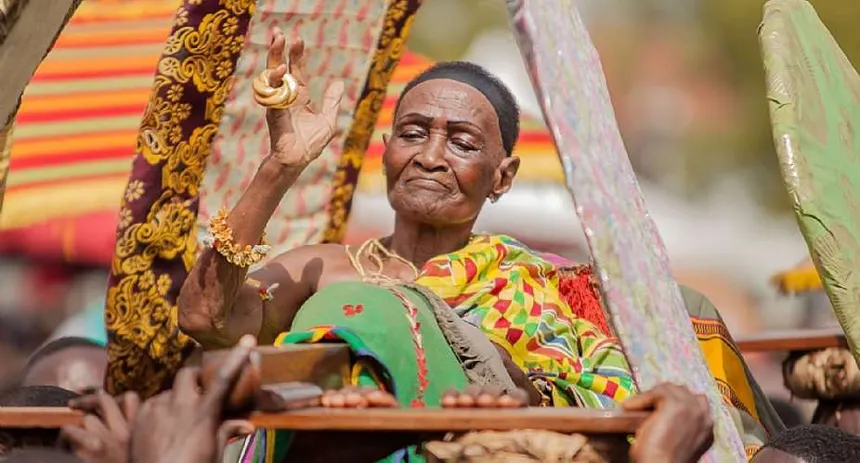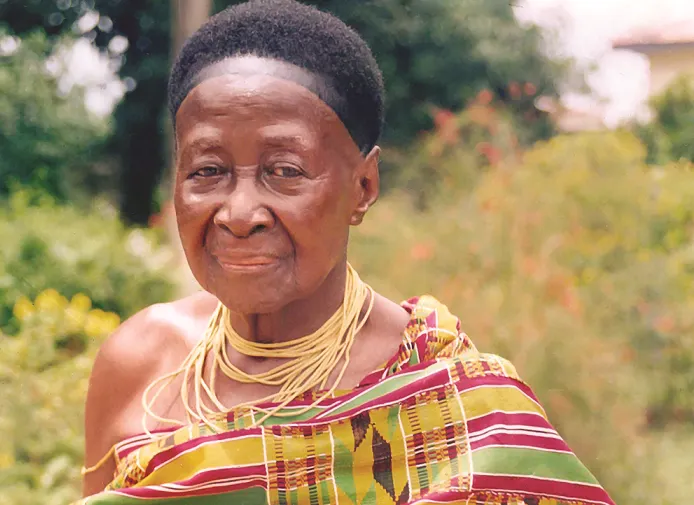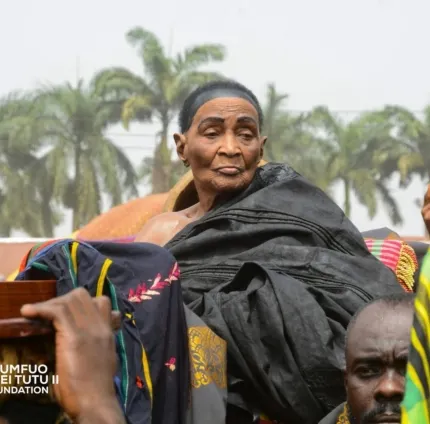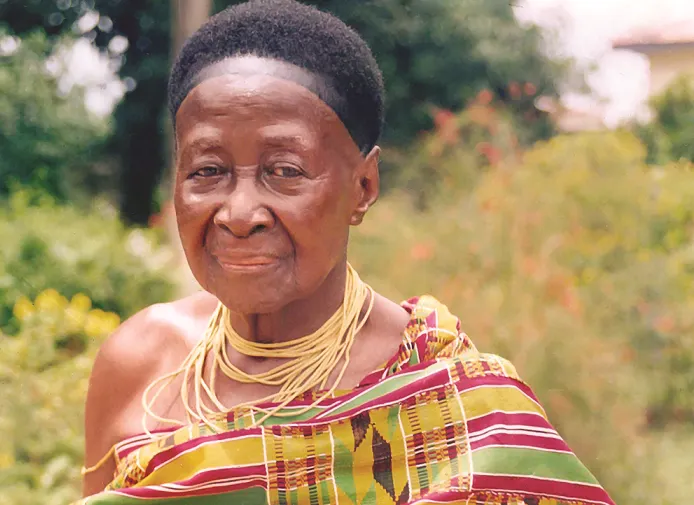Nana Konadu Yiadom III: Life and Legacy

Nana Konadu Yiadom III: Life and Legacy. In the rich cultural tapestry of Ghana’s Ashanti Kingdom, the role of the Asantehemaa—the Queen Mother—has always been central to governance, tradition, and societal cohesion. Among the distinguished women who have occupied this revered position, Nana Konadu Yiadom III stands out as a figure of remarkable dignity, wisdom, and compassion. Serving from 2017 to 2025, she left behind a legacy that not only preserved the heritage of the Ashanti people but also advanced social welfare, particularly for women and children.
Table of Contents
Her reign bridged the worlds of ancient tradition and modern Ghanaian society, providing counsel to kings, guidance to chiefs, and inspiration to women across the nation. At the time of her passing in August 2025, she was remembered not only as a custodian of Ashanti royalty but also as a motherly figure whose benevolence extended beyond the palace walls. Nana Konadu Yiadom III: Life and Legacy.
Early Life and Family Background
Born in 1927 at the Benyaade Shrine in Merdan, Kwadaso—a place deeply tied to Ashanti spirituality—Nana Ama Konadu was destined for a life interwoven with tradition and cultural responsibility. She was the eldest child of Nana Afia Kobi Serwaa Ampem II, the 13th Asantehemaa, and Opanin Kofi Fofie, a skilled carpenter from Besease near Atimatim. Her royal bloodline was unquestionable, as she was the sister of Otumfuo Osei Tutu II, the 16th Asantehene, making her position in the royal family both symbolic and deeply influential.
Her early life was marked by a blend of rural spirituality and urban exposure. Shortly after birth, she was placed in the care of her maternal aunt in Ashanti New Town, Kumasi, a hub of cultural interaction and commerce. Although she did not attend formal school, she received palace-based education—a rigorous upbringing that emphasized oral history, etiquette, diplomacy, and the customs of the Ashanti Kingdom. She grew up learning the Akan language’s refined court expressions, the genealogy of the royal lineage, and the ceremonial protocols that would later define her reign. Nana Konadu Yiadom III: Life and Legacy.
Her coming-of-age was marked by the bragro—the Ashanti puberty rites—signifying her readiness for adult responsibilities. In her youth, she married Opanin Kwame Boateng, a blacksmith from Aduman near Kumasi, strengthening her ties to other influential Ashanti families.
Religious Life and Social Values
In 1959, at the age of 32, she was baptized by the Saviour Church, receiving the Christian name Ruth. This baptism reflected her openness to spiritual diversity—she remained firmly rooted in Ashanti traditional beliefs while embracing Christianity. Through her royal status, she became an automatic patron of the Anglican Church, supporting both Christian and traditional religious institutions in the Ashanti Region.
Her religious life was a model of tolerance and integration. She attended church services, sponsored church events, and supported charitable activities while maintaining her position as the spiritual mother of the Ashanti Kingdom. This ability to blend traditional authority with Christian values allowed her to connect with a broad section of Ghanaians, from traditionalists to modern urban Christians. Nana Konadu Yiadom III: Life and Legacy.
Path to the Stool
The path to the revered position of Asantehemaa is not determined by mere seniority or popularity; it is steeped in tradition, guided by the Akan matrilineal succession system. For Nana Ama Konadu, the journey to the stool was both a matter of destiny and a test of endurance. Nana Konadu Yiadom III: Life and Legacy.
When her mother, Nana Afia Kobi Serwaa Ampem II, passed away on 15 November 2016 at the remarkable age of 111, it marked the end of an era. Afia Kobi had ruled as Asantehemaa for nearly four decades, providing consistent leadership through changing times. The Ashanti Kingdom, governed by a balance of the Asantehene and Asantehemaa, needed a successor who understood both the weight of tradition and the demands of a modern Ghanaian society.
The decision-making process involved the Asanteman Traditional Council, a body of chiefs, elders, and lineage custodians. Within the royal Oyoko clan, discussions centered on who could best embody the wisdom, patience, and moral authority the position required. Nana Ama Konadu’s age, experience, and intimate knowledge of the court made her the obvious choice.
On 6 February 2017, she was formally enstooled as the 14th Asantehemaa, taking the stool name Nana Konadu Yiadom III. The ceremony was both solemn and celebratory: palace linguists recited her lineage, chiefs offered libations, and drummers played the fontomfrom to announce her new status to the kingdom.Nana Konadu Yiadom III: Life and Legacy.
Her public outing as Asantehemaa took place on 6 May 2017, timed to coincide with the 67th birthday celebration of her brother, Otumfuo Osei Tutu II. This symbolic pairing underscored their shared responsibility as the twin pillars of Ashanti authority—the Asantehene as king, the Asantehemaa as the spiritual and maternal anchor. Nana Konadu Yiadom III: Life and Legacy.
Reign as Asantehemaa (2017–2025)
Nana Konadu Yiadom III’s reign spanned just under a decade, but it was defined by a blend of traditional leadership, social advocacy, and quiet diplomacy.
Guardian of the Matrilineal Line
As Asantehemaa, she was the custodian of the Oyoko royal lineage, with the authority to nominate and advise on the selection of future Asantehenes. Her counsel to the king carried immense weight, not only in succession matters but also in governance, conflict resolution, and cultural preservation. Nana Konadu Yiadom III: Life and Legacy.
In Ashanti custom, the queen mother is not a ceremonial figurehead; she is an active partner in governance. Nana Konadu sat in council with chiefs, mediated disputes, and ensured that traditional laws were applied with fairness. Her reputation for calm deliberation meant that both ordinary citizens and palace courtiers sought her judgment.
Advocate for Women and Children
Nana Konadu was deeply concerned with maternal health, child welfare, and women’s empowerment. She used her influence to encourage the education of girls in the Ashanti Region and beyond, often reminding families that educated women strengthen the entire community.
She also took a stand against harmful cultural practices that undermined women’s dignity. While she respected tradition, she was not afraid to speak against customs that were outdated or detrimental to health and well-being.
Philanthropy and Development Initiatives
One of the defining features of Nana Konadu Yiadom III’s reign was her philanthropy—not in grand, flashy gestures, but in targeted interventions that met real community needs. Nana Konadu Yiadom III: Life and Legacy.
Support for Health Facilities
On the fifth anniversary of her enstoolment in 2022, she made significant donations to the Mother-Baby Unit, Pediatric Intensive Care Unit, and Pediatric Emergency Unit at Komfo Anokye Teaching Hospital. She also extended her generosity to the Manhyia District Hospital, ensuring that mothers received better care during childbirth and postpartum recovery.
Her medical donations were not limited to equipment; she also funded free healthcare services for mothers who could not afford hospital bills, reflecting her belief that no woman should lose her life or child due to poverty. Nana Konadu Yiadom III: Life and Legacy.
Promotion of Breastfeeding
She partnered with health organizations to promote exclusive breastfeeding, a campaign that reached thousands of mothers in urban and rural Ashanti. She leveraged her status to bring attention to the nutritional and economic benefits of breastfeeding, countering the growing reliance on expensive infant formula.
Education Initiatives
Her commitment to education was formalized when the Saviour Church named a school in Bonwire after her—Nana Konadu Saviour School. She frequently visited schools, spoke to students about discipline, and encouraged them to pursue excellence. Nana Konadu Yiadom III: Life and Legacy.
Cultural, Political, and Historical Context
To fully understand the weight of Nana Konadu Yiadom III’s position, one must first appreciate the role of the Asantehemaa in the Ashanti Kingdom. The Ashanti monarchy operates on a dual leadership structure—the Asantehene, as the political and military leader, and the Asantehemaa, as the maternal and spiritual authority. This duality ensures a balance between governance and moral guidance, between the sword and the womb, as Ashanti elders would say.
The Asantehemaa’s Historical Role
The queen mother is not merely the mother of the king; she is the mother of the nation. Historically, she has the power to:
- Nominate the Asantehene by selecting a candidate from the royal matrilineal line.
- Serve as chief advisor to the king.
- Act as the guardian of Ashanti customs and traditions.
- Provide counsel in cases involving family disputes, inheritance, and chieftaincy matters.
- Lead initiatives for women’s welfare and children’s education.

In this context, Nana Konadu Yiadom III’s reign was a continuation of a centuries-old lineage of formidable women, but she also brought a modern sensibility to the role. She balanced respect for ancient rites with an openness to progressive change. Nana Konadu Yiadom III: Life and Legacy.
Navigating Modern Challenges
The Ashanti Kingdom, though traditional in structure, exists within the framework of the modern Ghanaian state. This means that the Asantehemaa’s influence is both symbolic and practical. Nana Konadu navigated:
- Urbanization pressures in Kumasi, where traditional lands faced encroachment from development.
- Cultural erosion, with younger generations drifting from Ashanti customs.
- Economic inequalities, especially affecting rural Ashanti communities.
Her approach was quiet diplomacy—avoiding political entanglements but advocating for policies that benefited her people. She attended state functions when necessary, representing the Ashanti royal household with dignity, but her true focus remained on the grassroots: mothers, children, and community leaders. Nana Konadu Yiadom III: Life and Legacy.
Preservation of Cultural Heritage
Nana Konadu made deliberate efforts to preserve Ashanti heritage. She encouraged the continued practice of important festivals such as Akwasidae, where chiefs and subjects gather at the Manhyia Palace to honor ancestors. She ensured that during her reign:
- Palace protocols remained intact.
- Royal regalia, from kente cloth patterns to ceremonial stools, were properly maintained.
- Oral history was documented and passed to younger generations.
Her insistence on cultural continuity ensured that the Ashanti Kingdom retained its unique identity amidst the waves of globalization. Nana Konadu Yiadom III: Life and Legacy.
Later Years and Passing
Maintaining Public Presence in Advanced Age
Even into her nineties, Nana Konadu maintained a visible and active presence in Ashanti life. She attended palace functions, offered public blessings, and was often seen sitting beside the Asantehene during durbars. Her voice was calm but commanding; when she spoke, chiefs listened.
As age advanced, she delegated some duties to trusted palace officials, but she never withdrew entirely. Those who visited her in the palace described her as sharp-minded, with a remarkable memory for names, events, and family histories.
Death and Official Announcement
On 7 August 2025, Nana Konadu Yiadom III passed away peacefully at the age of 98. Her death marked the end of a significant chapter in Ashanti history.
Four days later, on 11 August 2025, the Asantehene, Otumfuo Osei Tutu II, announced her passing during an emergency meeting of the Asanteman Traditional Council at the Manhyia Palace. The announcement was made with traditional protocol: drums ceased, elders bowed their heads, and a moment of silence was observed. Nana Konadu Yiadom III: Life and Legacy.

One-Week Observance
Plans for her one-week observance were quickly put in motion, with the date set for 21 August 2025. The event was to be held at the Manhyia Palace and attended by chiefs, queen mothers, government officials, and ordinary citizens alike. The one-week observance in Ashanti tradition is both a mourning period and a time for the community to begin preparations for the final funeral rites.
The palace grounds were expected to be adorned with black and red cloth, symbols of mourning in Akan culture. Drummers would play solemn rhythms, while traditional priests offered prayers for her safe journey to the ancestral realm. Nana Konadu Yiadom III: Life and Legacy.
Legacy
A Reign Defined by Compassion
Nana Konadu Yiadom III will be remembered for her unwavering compassion. Her dedication to improving maternal and child health left tangible impacts in hospitals and communities. Her advocacy for education, especially for girls, planted seeds that will bear fruit for generations. Nana Konadu Yiadom III: Life and Legacy.
Symbol of Cultural Continuity
She bridged the gap between the Ashanti Kingdom’s past and present. In an era where many traditional leaders struggle to stay relevant, she demonstrated that cultural authority, when exercised with wisdom and humility, can coexist with modern governance. Nana Konadu Yiadom III: Life and Legacy.
Inspiration for Women Leaders
As one of the most respected female traditional leaders in Ghana, Nana Konadu served as a role model for women in leadership. She showed that leadership is not about loud displays of power, but about quiet influence, moral guidance, and service. Nana Konadu Yiadom III: Life and Legacy.
Enduring Lessons
From her life, future leaders can learn:
- Patience in decision-making — she was never rushed into public statements or judgments.
- Cultural stewardship — traditions can be preserved without being rigid.
- Service over status — her focus was always on people, not personal gain.
Nana Konadu Yiadom III: Life and Legacy
When the life of a leader such as Nana Konadu Yiadom III is examined in its entirety, it becomes clear that her greatness was not solely in her position, but in how she carried it. She did not seek to dominate with authority; instead, she sought to guide with wisdom. She understood the delicate balance between tradition and modernity, between the past and the future, and she walked that line with grace for nearly a century.
A Life Anchored in Service
From her earliest years in Ashanti New Town to her final days in the Manhyia Palace, Nana Konadu embodied service over self. Her compassion was not an occasional gesture but a way of life—whether she was intervening in a family dispute, funding hospital care for a struggling mother, or offering counsel to the Asantehene on matters of succession.
Her reign showed that the Asantehemaa’s role is not ornamental. She was a decision-maker, a cultural guardian, and a moral compass for the Ashanti Kingdom. In a world where leadership is often measured by public appearances and political influence, she proved that quiet influence can be just as powerful. Nana Konadu Yiadom III: Life and Legacy.
Cultural Guardian in a Changing World
One of the most enduring aspects of her reign was her commitment to cultural preservation. She knew that traditions are the soul of a people, and if they are lost, identity is weakened. Under her watch:
- Royal protocols remained intact.
- Ashanti oral history was actively passed down.
- Ceremonial rites were performed with their intended dignity.
Yet, she was not afraid to adapt. She recognized that not all traditions serve the modern community and was open to refining customs that conflicted with health, safety, or dignity.
An Intergenerational Bridge
Nana Konadu connected generations. Elders respected her for upholding the customs they grew up with, while the younger generation admired her openness to education and healthcare initiatives. She demonstrated that tradition does not have to be a relic—it can be a living guide that evolves with time. Nana Konadu Yiadom III: Life and Legacy.
A Legacy of Empowerment
For women across Ghana, Nana Konadu was more than a queen mother; she was proof that women could lead with both strength and tenderness. She was a reminder that the feminine voice in leadership is not secondary, but essential. Her life taught that leadership grounded in empathy creates deeper and more lasting change.
Final Farewell
As the Ashanti people prepare for her final funeral rites, the grief is not only for the loss of a royal figure but for the absence of a motherly presence who shaped the moral and cultural direction of the kingdom for decades. Her passing leaves a space that will be difficult to fill, but her legacy provides a blueprint for whoever will follow. Nana Konadu Yiadom III: Life and Legacy.
Closing Thoughts
The story of Nana Konadu Yiadom III is a story of quiet strength, cultural pride, and lifelong service. It is a story that belongs not only to the Ashanti people but to all Ghanaians who believe in the power of tradition to inspire progress.
Her journey—from a young girl learning customs at her aunt’s side, to the spiritual mother of one of Africa’s most enduring kingdoms—shows that leadership is not about the length of one’s reign, but about the depth of one’s impact.
When history remembers her, it will not only list the years she served but will speak of the lives she touched, the traditions she protected, and the dignity with which she lived.
Nana Konadu Yiadom III will forever remain a shining example of what it means to lead with a mother’s heart and a queen’s wisdom. Nana Konadu Yiadom III: Life and Legacy.



